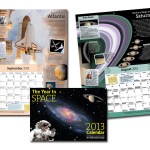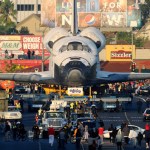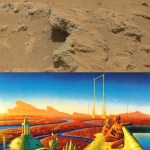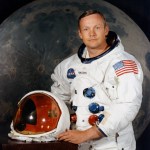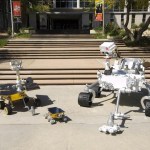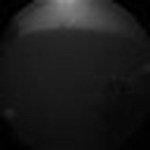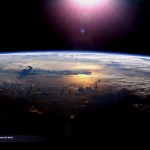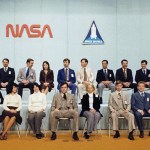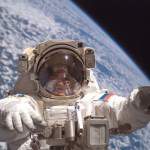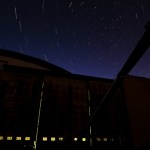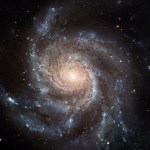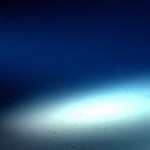space
"And in the end
The love you take
Is equal to the love you make." -Paul McCartney
Every once in a while, I throw the chance out there (on facebook, twitter, or google+) to ask me whatever questions you want. Yesterday, for some insane reason, I invited people across all three platforms to ask me whatever they liked, with a dual promise that I'd not only answer them, but that the best ones would receive a free "The Year In Space" calendar for 2013, courtesy of the Planetary Society.
Image credit: The Planetary Society.
So I got a ton of questions, and now I'll do my best to answer…
"This one will look like a jellybean," the session director warns us. "Or, you know, when you empty a hole punch? The circles of paper that fall out? One of those." She's talking about Neptune, and I am about to step, carefully, up a ladder painted industrial yellow and wheeled into place in front of the centenarian eyepiece of the 60" Hale telescope at Mt. Wilson Observatory, incidentally the very place where Edwin Hubble, in 1925, discovered that our galaxy was not the entirety of the Universe, and later, that our Universe was expanding.
A jellybean, a piece of confetti: it seems her…
"Forget it. I didn't have that thing inside me where I wanted to smash against somebody and watch them break. I was too sensitive for that and disliked being that sensitive." -Josh Brolin
How do you figure out what something is made of? You take it apart -- cracking it open if necessary -- and look inside. This is something we've been doing since... well, since before our ancestors were even human.
Images credit: Elisabetta Visalberghi.
For most things here on Earth, that's easy enough. If you wanted to go down to the smallest scales possible, however, it becomes harder and harder to "crack…
Jack Parsons (1914-52) was a rocketry pioneer, a science fiction fan and a deeply committed occult follower of the aged Aleister Crowley. I recently read the 2004 edition of John Carter's biography of the man, Sex and Rockets. The Occult World of Jack Parsons.
Despite such promising material, it's not a very engaging or well-written book. It's largely about rocketry and occultism, but neither field is contextualised very well. There's lots of detail but not much in the way of a bigger picture. And Carter equivocates in his attitude to occultism. Sometimes he seems to believe in it, sometimes…
Stewart Brand, writing about space colonies, observed that "if you live in a satellite, the Earth is something that goes on in your sky."
For Felix Baumgartner, the daredevil skydiver who seduced the world with his chiseled jaw and seeming invulnerability to fear (and who broke the sound barrier with his body last weekend) the Earth is something else. The satellite he leapt from, a weather balloon 24 miles above the Earth, wasn't his home. But briefly, and especially for the millions who watched the gossamer balloon float upwards to the strange blue-black gradient of space's edge, it…
The space-heads among you have undoubtedly heard about the Curiosity rover's first significant discovery: the remnants of an ancient streambed on Mars, which would seem to indicate the presence of water in the planet's history. This jagged pile of alluvial rock and dust may not look like much, but it brings to mind one of my favorite pieces of Martian historical arcana.
For a time in the late 19th century, it was believed that there were canals on Mars.
The Italian astronomer Giovanni Schiaparelli, who observed Mars in 1877, was the first to describe, name, and lovingly illustrate…
“At the last dim horizon, we search among ghostly errors of observations for landmarks that are scarcely more substantial. The search will continue. The urge is older than history. It is not satisfied and it will not be oppressed.” -Edwin Hubble
While new discoveries are made about the Universe, a new explorer finds its way on a foreign world, and the world bids farewell to a legend, my old favorite -- the Hubble Space Telescope -- keeps amazing us all.
Image credit: NASA / STS-125, Space Shuttle Atlantis, Ruffnax (Crew of STS-125).
Now more than 22 years into its continuing mission, this…
Yesterday we lost Neil Armstrong, an accidental hero, thrust by fate onto a rock in the sky. Many dreamt of walking on the moon before he did, and a few men did after him. He happened to be the first. Hopefully many more men, and women too, will echo his iconic footsteps in the future. Perhaps even future space tourists will huddle around Tranquility base, laying nostalgic 60s filters over their high-resolution snapshots of an upended American flag from a long-ago mission.
We can only hope. A lot of my favorite humans have died this year: Armstrong, Sally Ride, Ray Bradbury, all people who…
"Geologists have a saying: rocks remember." -Neil Armstrong
Looming up above us, hundreds of thousands of miles away, is the largest moon in the inner solar system: our Moon.
Image credit: © 2004 by Ulli and Christian 'Pete' Lotzmann.
One of the greatest achievements in the history of our planet culminated on July 20th, 1969, when the first creatures from our world set foot on the Moon, becoming -- as far as we know -- the first creatures to ever willingly leave their own world and land on another.
Image credit: NASA, of Neil Armstrong's descent towards the lunar surface.
The honor of the…
"I am looking at the future with concern, but with good hope." -Albert Schweitzer
As you all know, the most ambitious interplanetary mission ever attempted -- Mars Science Laboratory -- successfully landed its Curiosity rover on Mars earlier this week. Last night, I had the opportunity to go on my local news and speak a bit about it, and as always, it was an absolute pleasure.
(Video credit: KGW / Ben Lacy / Carey Higgins / Steph Stricklen.)
Of course we got to talk about the rover itself and its science potential, and exactly how much more sophisticated it is than any of its martian…
The Curiosity rover / Mars Science Laboratory has landed safely on Mars and is returning data! So now we have two rovers on Mars again, Opportunity and a new one of unprecendented size and instrument sophistication. Curiosity has a laser gun that allows it to measure emission spectra at a distance, an instrument that allows it to identify minerals directly without inference via their elemental composition, and more. Looking forward to new discoveries!
The NASA Mars rover Curiosity just landed on Mars. Those of us who tuned in vicariously via NASA's live coverage watched as a roomful of tense engineers exploded, and heard their disembodied voices whispering and booming through the control room. Holy shit. We did it. Their headsets fell askew, they glad-handed one another, criss-crossing the room, and then, immobilized by a sudden hush as the news spread: We've got thumbnails.
Thumbnails. We watched as a tiny image formed, transmuted across the void of space and into this room. It was black and white, an indistinguishable gesture of light…
"How old would you be if you didn't know how old you are?" -Satchel Paige
Today marks another year and another trip around the Sun for me. For you, and me, and everything on Earth that makes it through another year on this world, there's a whole lot we get to experience.
Image credit: NASA / ISS Expedition 13.
Some things are tiny: the Earth's rotation slows by about two millionths of a second each year, while some are large: we hurtle over 900 million kilometers in outer space as we orbit around the Sun. Our Earth spins just over 366 times on its axis, while our one revolution around…
View from the ISS at Night from Knate Myers on Vimeo.
"Each generation goes further than the generation preceding it because it stands on the shoulders of that generation. You will have opportunities beyond anything we've ever known." -Ronald Reagan
Earlier today, Sally Ride, the first American woman ever to fly in outer space, passed away at the age of 61 from pancreatic cancer. To many different people, her life, her achievements, and her death means a great diversity of things. To anyone with a love of outer space, human exploration, and achieving your dreams, her story will likely resonate with you, too. I'd like to share with you what are,…
"We came all this way to explore the Moon, and the most important thing is that we discovered the Earth." -Bill Anders, Apollo 8 astronaut
From hundreds of miles up, the International Space Station speeds around the Earth, completing 18 orbits a day, looking down on us and returning some absolutely fabulous images.
Image credit: Fyodor Yurchikhin and the Russian Space Agency Press Services, of Greenland from the ISS.
But what you may not appreciate is that my favorite images taken from the ISS weren't taken by American Astronaut Don Pettit (better known as @astro_Pettit), but rather by…
"Building one space station for everyone was and is insane: we should have built a dozen." -Larry Niven
Here on the solid ground of the Earth, the Sun and Moon rise and set on a daily basis. During the hours where the Sun is invisible, blocked by the solid Earth, the stars twirl overhead in the great canopy of the night sky.
Image credit: Chris Luckhardt at flickr.
In the northern hemisphere, they appear to rotate around the North Star, while in the southern hemisphere, the stars appear to rotate about the South Celestial Pole. The longer you observe -- or for photography, the longer you…
"This seems to be the law of progress in everything we do; it moves along a spiral rather than a perpendicular; we seem to be actually going out of the way, and yet it turns out that we were really moving upward all the time." -Frances Willard
As spring gives way to summer here in the Northern Hemisphere, one of the most beloved sights of the night sky becomes ever more prominent: the Big Dipper.
(Image credit: NASA, ESA, Z. Levay (STScI) and A. Fujii.)
These seven bright stars shine high above the horizon after sunset, and will continue to do so over the rest of the Spring and all Summer…
Is poetry a driving force of Oceanography?
Read Rimbaud!
- Phillipe Diolé
I've written many times, although not recently, about the ocean.
When I first began Universe in 2005, it was practically a ship's log: meandering pieces on narwhal tusks, the accidental poetics of my hero, Rachel Carson, and adolescent screeds on the perils of the Mariana trench. At some point in my career, I ported my energies outward to the cosmos, reasoning, as the ancient alchemists did, that "As Above, So Below."
The movement from the deep to the distant, from sea to space, seemed like a sensible evolution.…
By Larry Bock
Founder and organizer, USA Science & Engineering Festival
Encouraging and motivating kids early in science and engineering via exciting, hands-on interactions in discovery may be one of the most important steps to boosting their interest and performance in these fields.
But if you think this job falls to teachers alone, you're wrong. Parents can, and should, play an active and frequent role outside the classroom, especially in creative ways that keep children's innate sense of curiosity and exploration alive.
"Kids love the chance to try experiments, visit zoos, or watch…
